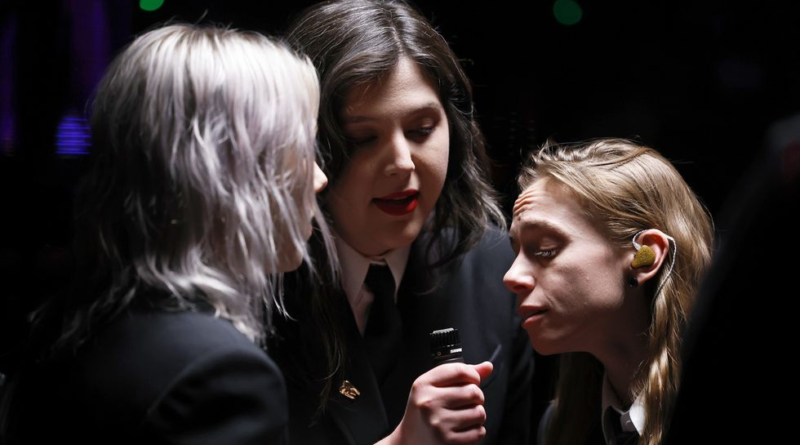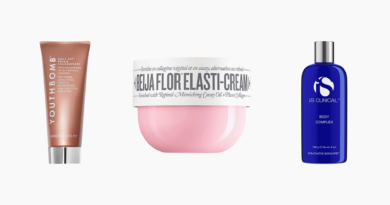Boygenius Make Me Feel Like a Queer Teen Again
As a teen girl in the early aughts in Los Angeles, I did what I was supposed to do: hang pictures of Josh Hartnett on my walls and sob in the theater while Ryan Gosling kissed Rachel McAdams in the rain. I could play the part without even realizing I was acting, but I couldn’t muster the bone-deep cravings my friends seemed to have, especially when it came to boys in bands. I’ll never forget my friend practically rending her garments over the All-American Rejects before they made it big, saying she would desperately miss them between tiny venue shows and dream about them at night. That desperate, teen obsession bordering on madness for boys with guitars—the forums, LiveJournal communities, memorizing the lyrics, writing them on binders, knowing every fact that ever exists—it didn’t do it for me.
That is, until a new set of “boys in the band” came around in the form of Julien Baker, Lucy Dacus, and Phoebe Bridgers. The shape of my obsession with supergroup boygenius—which started with the 2018 EP but reached a fever pitch when their album, the record, dropped in March—is embarrassing, maniacal, and distinctly teenage.
I now find myself in a community of queer women far beyond our teenage years who—for the first time—are experiencing that deeply youthful obsession of band idol worship. Women like me who humiliatingly spend hours on TikTok watching tour videos every single night, who refresh YouTube daily for new interviews, who screenshot and save the band’s pictures in some desperate need to hold them close, who dig for secret messages and easter eggs on Reddit forums. (The boys—as they call themselves, or sometimes “brothers”—certainly have crazed appeal beyond the desperate screams of aging queer women like me. My tender-hearted, straight best friend is completely obsessed with them — he’s just less embarrassing about it than I am.)
“They’re like the queer Beatles,” says Lindsay Buchanan, 31. “Folks were literally passing out at the Houston show, and I don’t think it was heat-related.”
The obsession with the boys has “the feeling of wanting to take in anything there is to know about them that they choose to share,” says Nancy, 31. (She asked that her full name be withheld for privacy reasons.) She’s been reading all the articles, scrolling a boys-dominated TikTok FYP, buying merch, and listening to the record in full on repeat. She likens it to her teen fixations: Hanson, One Direction, and BTS—but with a particular new set of boundaries, perhaps from age: “Julien, Phoebe, and Lucy feel more like real humans than the boy bands sometimes did,” she says. “I just don’t feed into that invasive energy the same way that I used to back in my 1D days.”
It’s a distinction that’s key to the version of teen love we’re having as adults. “I’ve seen Phoebe and Lucy live, and even when I watch interviews or watch videos of their performances on YouTube, there’s a giddiness I feel that I felt when I was younger and into Britney Spears, the Backstreet Boys, and *NSYNC,” says Jess Bilodeau, 32. But Bilodeau, like Nancy, is wary of the parasocial relationship that’s taken hold among a contingent of boygenius fans. “They don’t owe anyone details on their personal [lives]”, she says. (Bridgers and Dacus, for example, have spoken about a fixation on their sex lives and fans’ desire for the two to prove their queerness or do what they call “turning in their gay paperwork.” Fans, too, are sometimes subject to this same scrutiny.)
“I’m obsessed with them in a much more healthy way,” Bilodeau says. “It’s also nice that many of their fans are queer, so that adolescent giddiness I feel… [is] shared between most of us.”
Obsessive love for the boys also comes with an idolization many of us queer women missed out on growing up. They’re “role models for unapologetic presentation of selfhood,” says Buchanan. “Even though they’re all younger than I am, I kind of look up to them.”
This content is imported from youTube. You may be able to find the same content in another format, or you may be able to find more information, at their web site.
While queer bands like MUNA—who are opening for boygenius at their just-announced October show at Madison Square Garden—are equally obsession worthy (see: the hours I spend watching their Tiny Desk), the boys have a seemingly unique ability to speak to our much younger and current selves all at once. “The lyrics are so of that [young] age…while also speaking to the woman I am today. It crosses time and age,” says Heather Eden, 45.
The boys are an absolutely perfect target for this long-latent, obsessive, or as 34-year-old Joanna Emmet puts it—“feral”—desire. (Emmett happens to have been my first girlfriend in those closeted high school days. That she was the first person to whom I spoke for this article is a deeply queer bit of symmetry.)
Consider what they give us: Do they have lore about their personal relationships? Check. Do they touch or kiss or generally shower each other with heart-melting affection? Check. Is there a web of songs written about each other—with each other’s backing vocals—to analyze? A video of Baker winking when she sings “make fun of the cowboys with their neck tattoos?” Absolute pandemonium when she wore her hair in a bun for a recent show? Check, check, check.
There’s also the matter of seeing and being seen. The boys’ music is “more central to what I’ve felt has been my actual queer experience,” Buchanan says, noting that even in our so-called progressive era, queer women are either invisible or vilified. Boygenius writes about “feeling intense joy about another person just shining their light on you, being grateful that someone else is alive/in your life, and being so monumentally hurt by a person’s actions but not necessarily blaming them for it. It’s more about the way that receiving or losing love makes them feel, rather than the action of ‘loving’ itself, which has been really central in other depictions of queer folks in art in past decades.”
For Nancy, she’s been looking for herself in music for her whole life, “applying the bits and pieces I can or imagining how it would feel if I was them.” But, she says, “there’s no imagining to be done here. It’s like when you meet someone and you just understand each other intrinsically.” It’s enough to make anyone feel young again.
This content is imported from youTube. You may be able to find the same content in another format, or you may be able to find more information, at their web site.
That uniquely teen experience of band obsession is a rite of passage—especially given that it’s one of the first times we become aware of all-consuming, bigger-than-us desire. Thirsting over musicians as a teen is a socially sanctioned act of desperation, one we do with our friends, holding hands at shows, screaming every word. Sobbing uncontrollably, our bodies wracked with want. While sometimes it’s sexual, I’d argue that band obsession transcends physical desire. To obsess about a band as a teenager is to want to possess them—as lovers, maybe, but also as objects to place your adoration. It’s a fervent hope to be seen by them, to be acknowledged, to tell them what they mean to us. To become them. It’s a way to be very, very young.
With the euphoria of the do-over comes a deep sadness—mourning for what could have been. When Nancy saw the boys play at their Pasadena show in June, she felt—alongside pride and joy—“grief for little closeted Nancy and envy of the young queers of today getting to know and embrace such an intimate part of themselves so much earlier than I did.” It’s almost impossible not to spin out the other ways it could have gone, a gentler, kinder young life. To be young when you’re actually young and not an adult cosplaying with glitter eye shadow.
At the boys’ June show at Forest Hills Stadium in New York City, I scanned the crowd for other people my age. I was completely overwhelmed by the number of young queers—most of whom looked about 15 to me, as most people under 25 do—and it was hard not to imagine a version of my teen years surrounded by so many out queers. Soon, though, I started to see texture in the crowd, streaks of gray hair, crow’s feet, and immense beauty. We locked eyes, the older queers and I—in our 30s, 40s, 50s, and older, gave each other a nod or a smile. You, too? we seemed to say. Tonight, will you become very young with me? Or, as the boys might put it: Will you cry at the show with the teenagers?
When their trademark entrance “The Boys Are Back in Town” kicked up, my body became electric. I held hands with my best friends and my partner as we lost our minds, and when the boys finished “Without You Without Them,” haunting and ethereal, and ran out onstage to absolutely rip through “$20,” I could hardly stay standing. I put my finger over my phone flashlight to create a pink light among the throng during Dacus’ devastating line, “In the next one, will you find me? I’ll be the boy with the pink carnation pinned to my lapel.” I screamed along to “Not Strong Enough” and wept during the intersecting love songs “Please Stay,” “Favor,” and “Graceland, Too.” I barely survived the Dacus-Baker kiss/Bridgers-Dacus rolling-around during the “Salt in the Wound” finale.
At home, I watched TikToks from the show, reliving all of it, furiously texting the friends who were there with me. In my darkened bedroom, the phone screen lit up the walls.
Time flattened, and in my apartment in Brooklyn, in stadiums all over, we adults became teenagers again. This time, we fit.





